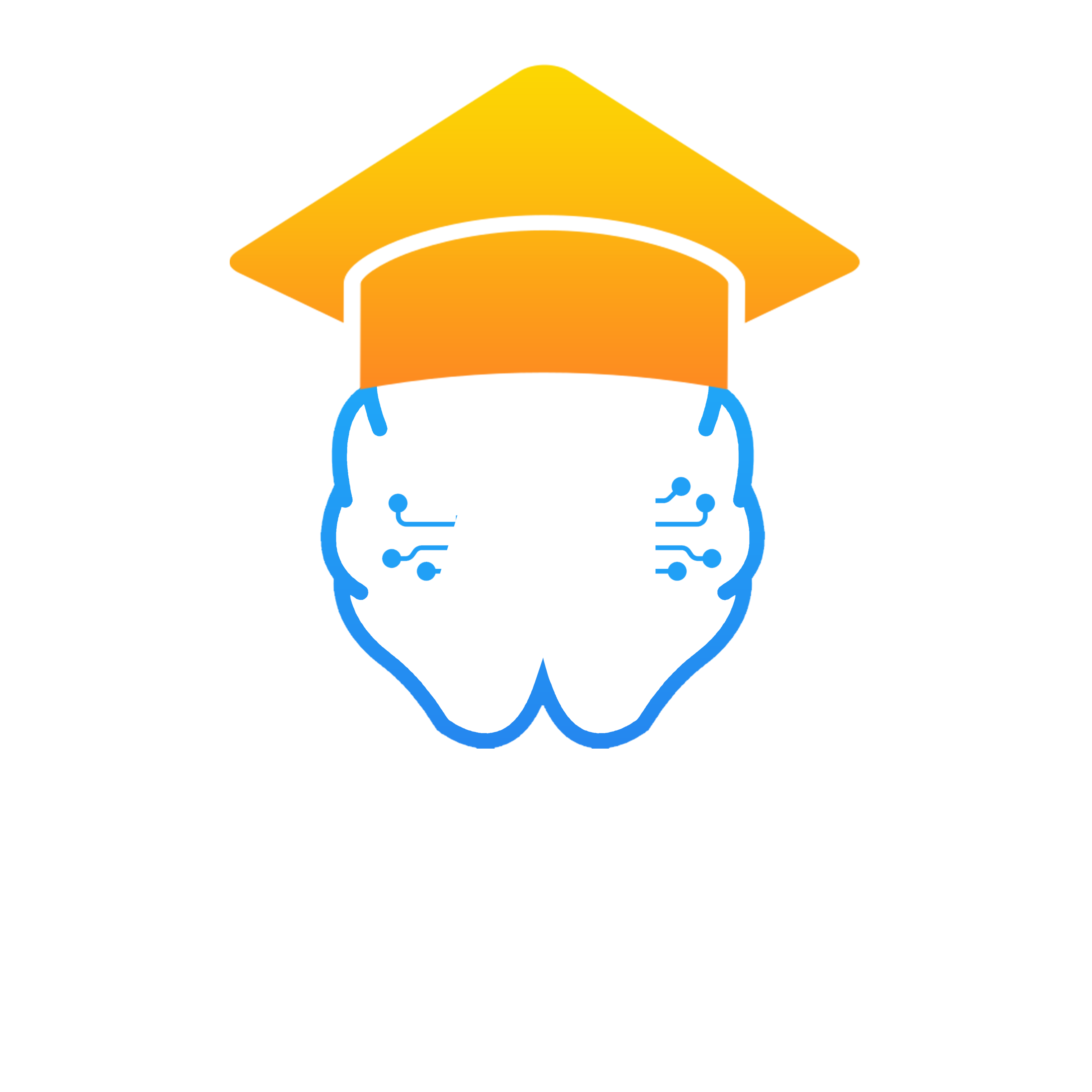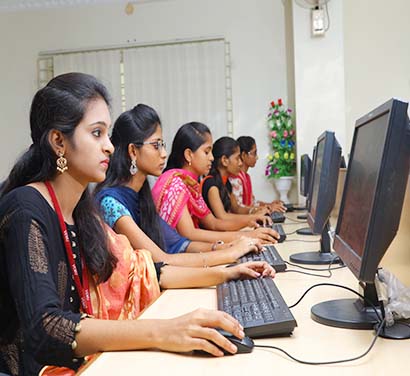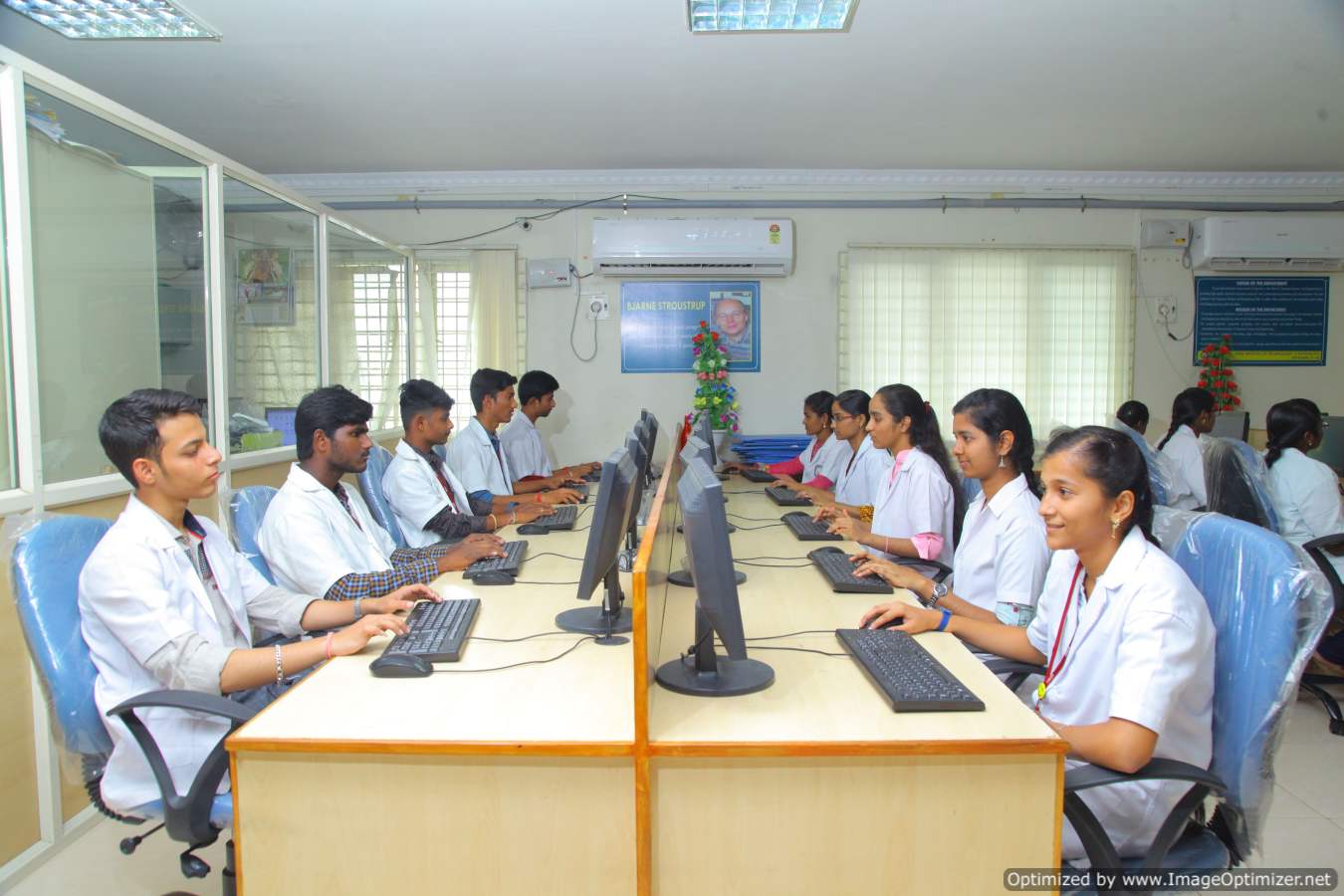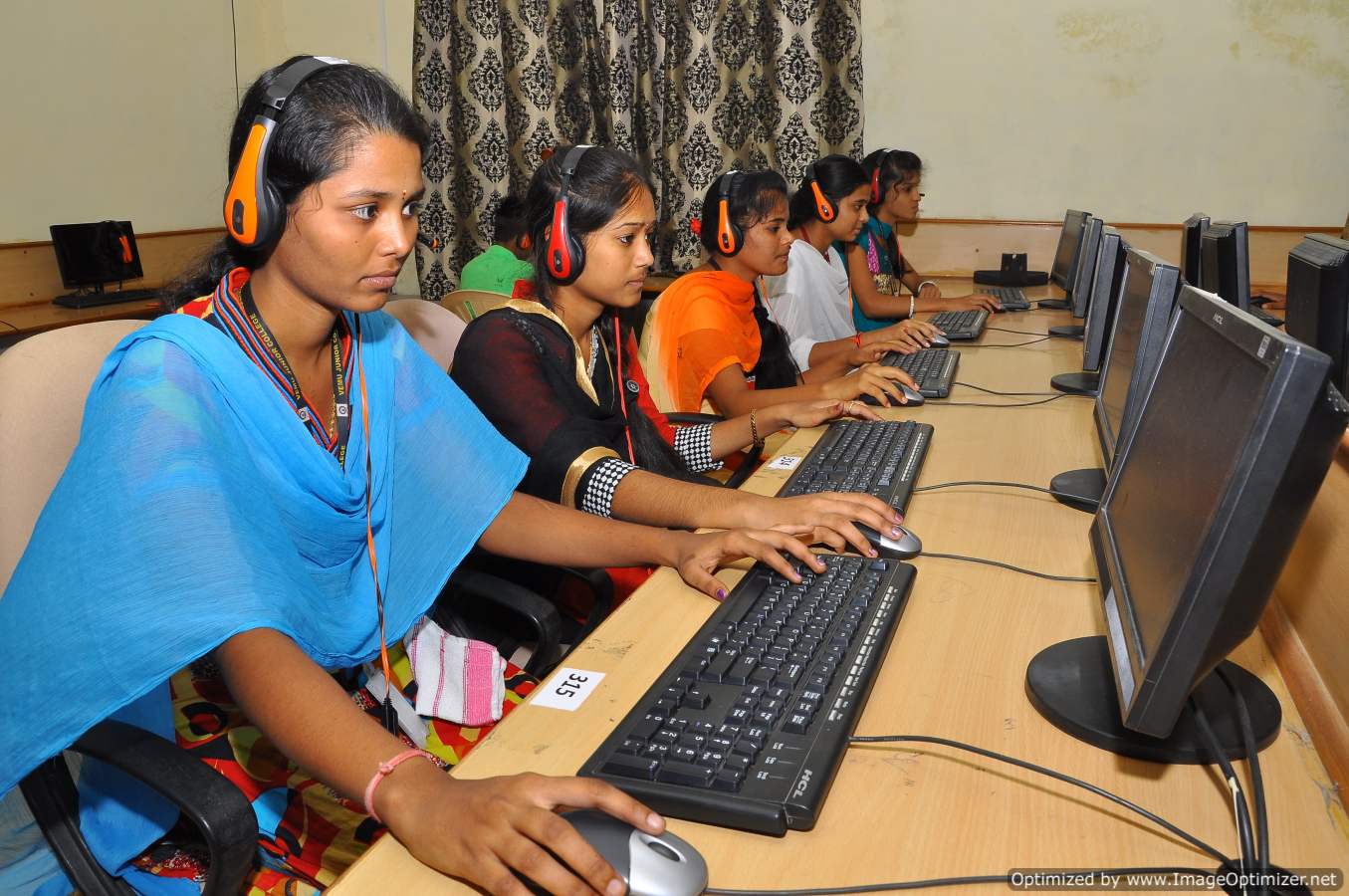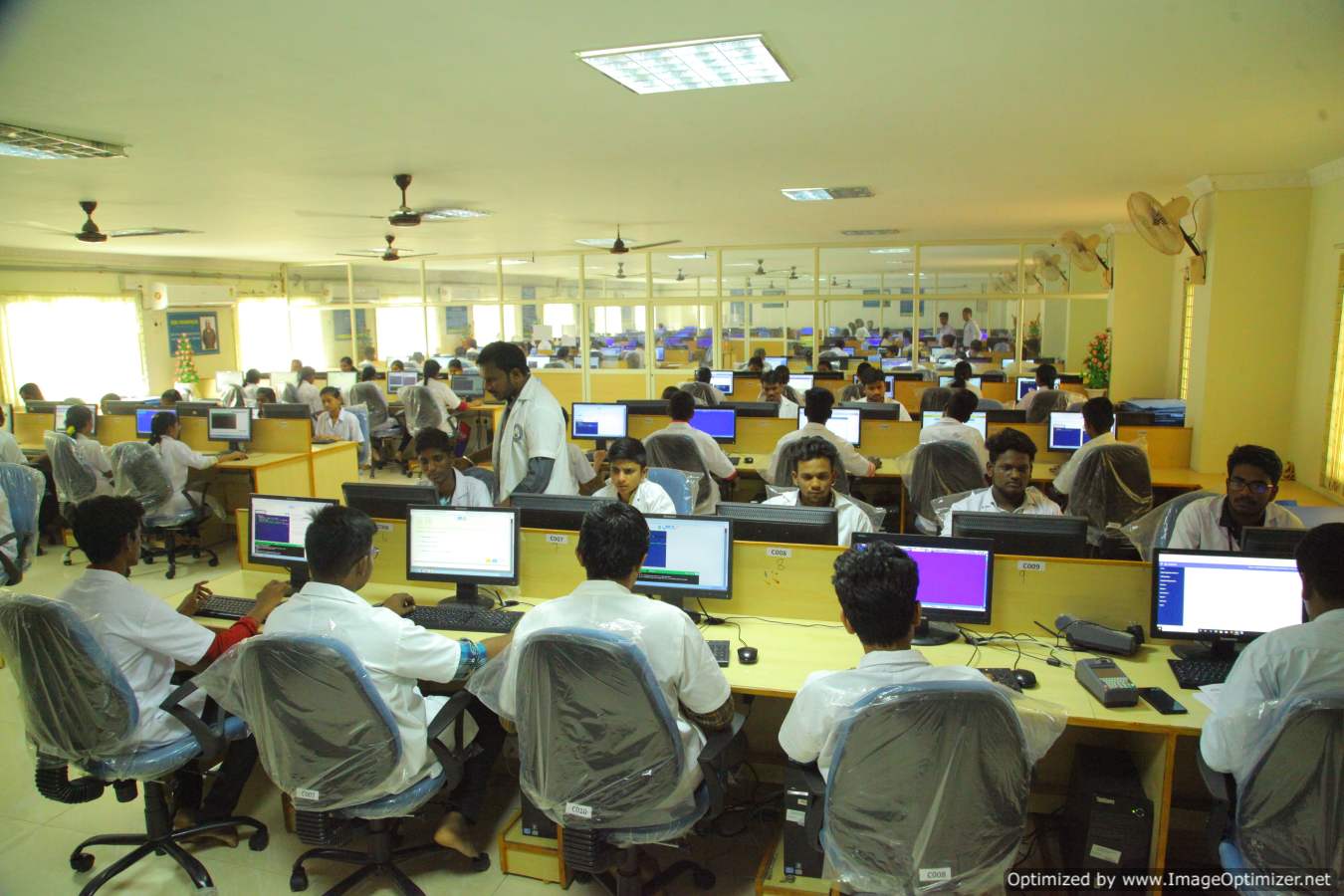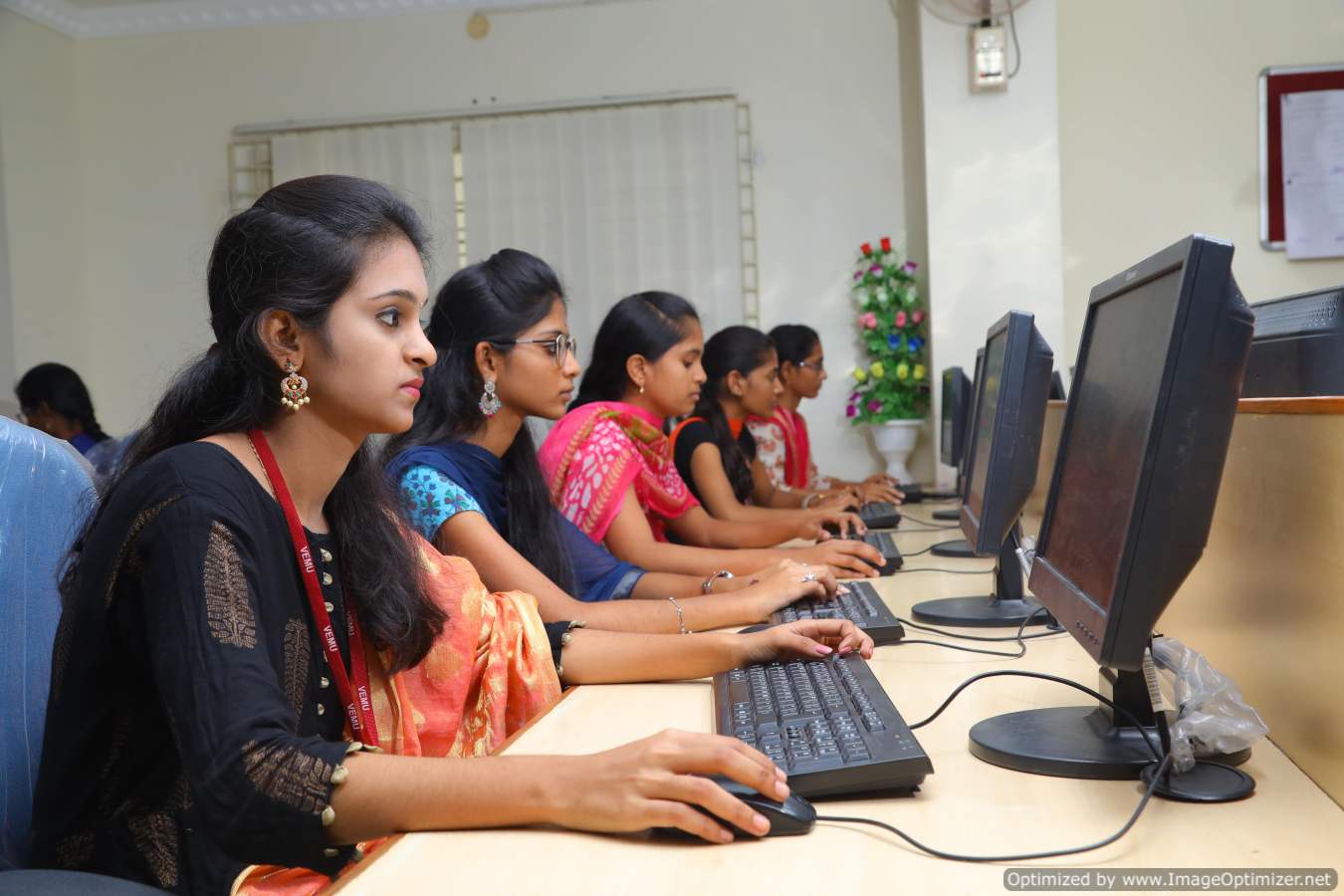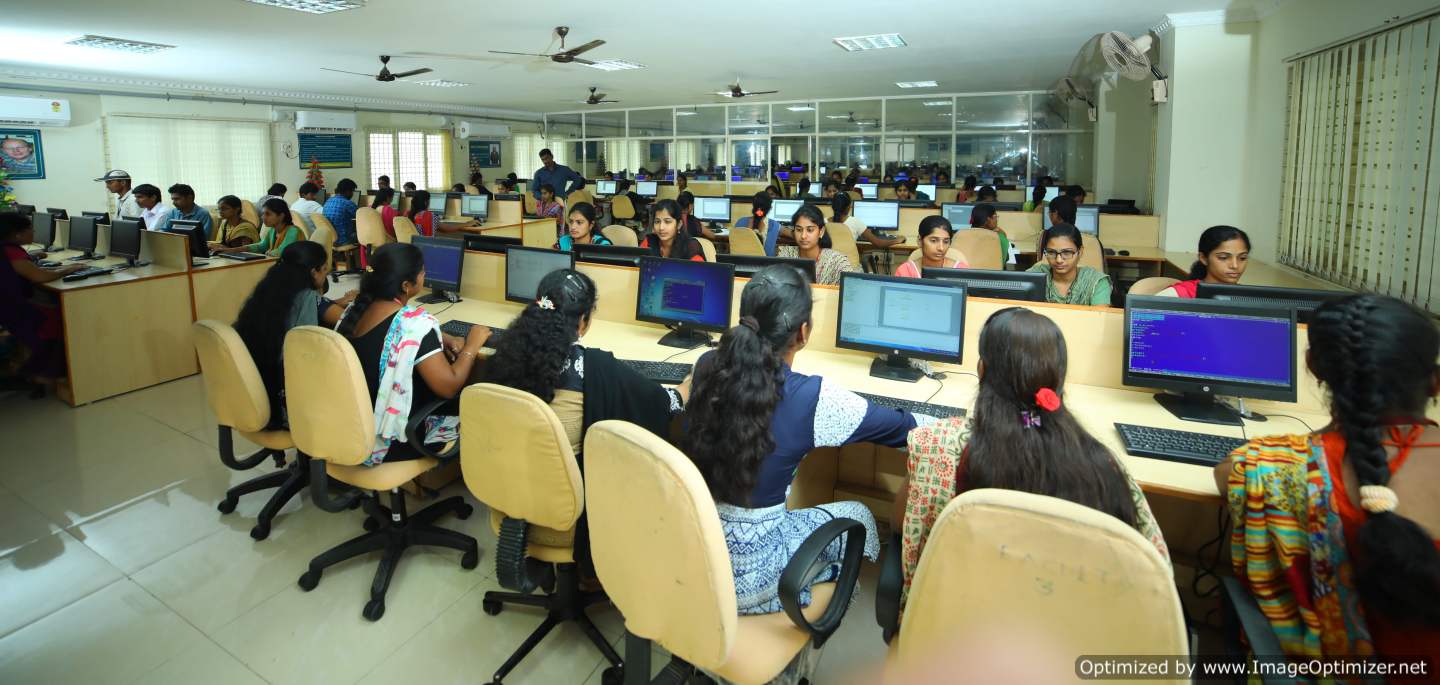Department of Computer Science and Engineering (CSE)
CSE Course Details
Department of Computer Science and Engineering (CSE)
The Department of Computer Science and Engineering (CSE) at VEMU is designed to equip students with the skills needed to excel in the rapidly evolving field of computer science. Our programs cover a wide range of topics, including software development, data science, artificial intelligence, and cybersecurity.
The department offers both Under Graduate programme – B Tech in Computer Science & Engineering and Post Graduate programs – M Tech in Computer Science and M. Tech in Computer Science and Engineering. With rapidly evolving technology and the continuous need for innovation, the Department has always produced quality professionals, holding important positions in Software and Information Technology and other Industries in India and abroad.
The Department moulds young outstanding engineers who are academically strong in both theory and practical. The department is constantly producing good results in University examinations.
The students are involved in industry-oriented real-time projects to learn the concepts in a realistic manner for better growth and effective career opportunities.
The department is instrumental in conducting several workshops, training programmes and internships with the help of Synergy Services- Bangalore based Voluntary Organization. It has been continuously upgrading the technical skills of the students.
The Department has got well equipped laboratories with high end computers and latest software applications. All these computing resources are inter-connected with high speed intranet having 100 Mbps dedicated Internet connectivity and 2 mbps shared line to the outside world and online access to e-journals.
The Department has a well-stocked library with over hundreds of titles on a variety of topics. Besides books, the library possesses tools and technology CDs, journals, project and seminar reports, lab manuals and question banks.
Key Highlights:
- Comprehensive Curriculum: Our courses cover both theoretical and practical aspects of computer science, ensuring a well-rounded education.
- Advanced Computing Facilities: Students have access to high-performance computing resources and modern software tools.
- Research Opportunities: We encourage students to engage in research projects, working alongside faculty on cutting-edge topics.
- Placement Support: Our strong industry connections help students secure placements in top tech companies.
Some of the important labs under the department are:
- C Programming & Data Structures Lab.
- Object Oriented Programming Lab.
- Database Management System Lab.
- Computer Network and Operating Systems Lab.
- UNIX internals Lab.
- Software Labs (1&2)- Data Structures & Algorithms & Web Technologies.
- OOAD & Data Warehousing and Mining.
The Alumni of the Department are well placed in various companies like Infosys, TCS, CTS, Wipro, Infinite, L & T Infotech, Akamai, Syntel, IP Soft, Quinnox, IBM, Milagrow, Cellcom, Tvarna, Sutherland Global, iGate, Mayur Group, HGS, Adithya Birla Minacs, Ionidea, Youngminds Technology Solutions, Zigma Technologies, etc. A good number of students have qualified many national level tests and are pursuing higher studies within India and abroad.
Department Vision:
To become a Centre of excellence in the field of Computer Science and Engineering by producing graduates with sound Technical knowledge, Research and Consultancy skills along with Lifelong Learning, Leadership qualities and ethics.
Department Mission:
To develop learners technically sound with strong theoretical and practical knowledge in Computer Science and Engineering discipline by state-of-the art laboratories, research facilities and core instructions through eminent faculty.
To enhance students in the cutting edge technologies with an emphasis on innovative ideas and problem solving skills with strong industry-institution interaction.
To make graduates globally competent with creative skills, leadership qualities, lifelong learning, social and ethical values by providing value based education.
POs,PSOs & PEOs
|
PO-1 |
Engineering knowledge: Apply the knowledge of mathematics, science, engineering fundamentals, and an engineering specialization to the solution of complex engineering problems. |
|
PO-2 |
Problem analysis: Identify, formulate, review research literature, and analyze complex engineering problems reaching substantiated conclusions using first principles of mathematics, natural sciences, and engineering sciences. |
|
PO-3 |
Design/development of solutions: Design solutions for complex engineering problems and design system components or processes that meet the specified needs with appropriate consideration for the public health and safety, and the cultural, societal, and environmental considerations. |
|
PO-4 |
Conduct investigations of complex problems: Use research-based knowledge and research methods including design of experiments, analysis and interpretation of data, and synthesis of the information to provide valid conclusions. |
|
PO-5 |
Modern tool usage: Create, select, and apply appropriate techniques, resources, and modern engineering and IT tools including prediction and modeling to complex engineering activities with an understanding of the limitations. |
|
PO-6 |
The engineer and society: Apply reasoning informed by the contextual knowledge to assess societal, health, safety, legal and cultural issues and the consequent responsibilities relevant to the professional engineering practice. |
|
PO-7 |
Environment and sustainability: Understand the impact of the professional engineering solutions in societal and environmental contexts, and demonstrate the knowledge of, and need for sustainable development. |
|
PO-8 |
Ethics: Apply ethical principles and commit to professional ethics and responsibilities and norms of the engineering practice. |
|
PO-9 |
Individual and team work: Function effectively as an individual, and as a member or leader in diverse teams, and in multidisciplinary settings. |
|
PO-10 |
Communication: Communicate effectively on complex engineering activities with the engineering community and with society at large, such as, being able to comprehend and write effective reports and design documentation, make effective presentations, and give and receive clear instructions. |
|
PO-11 |
Project management and finance: Demonstrate knowledge and understanding of the engineering and management principles and apply these to one’s own work, as a member and leader in a team, to manage projects and in multidisciplinary environments. |
|
PO-12 |
Life-long learning: Recognize the need for, and have the preparation and ability to engage in independent and life-long learning in the broadest context of technological change. |
|
PSO-1 |
Responsive to Ideas: Get an employment in Computer Science and Engineering field and related software industries or become an entrepreneur in the domains such as DBMS, Java, Networking, IOT, Mobile Computing, Artificial Intelligence and Cloud Computing. |
|
PSO-2 |
Domain Knowledge: Get qualified in competitive exams to Pursue Higher Education through the knowledge attained in advanced programming languages like Java, Machine Learning, PHP, Python, Android Studio, Hadoop Framework, AWS, R and Weka etc. |
|
PEO-1 |
To strengthen the learners with fundamental concepts of applied mathematics, applied sciences and basic engineering subjects to analyze and solve problems in Computer Science and Engineering. |
|
PEO-2 |
To produce academically strong and technically sound learners with core instructions, innovative design competence and development & testing skills, for offering solutions to real world problems using modern tools and techniques. |
|
PEO-3 |
To make the learners competent in advanced computer programming languages to become efficient professionals to sustain life long career. |
|
PEO-4 |
To support the learners with training, placement, career guidance & Research with multidisciplinary approach, professional ethics, leadership qualities and good communication skills. |
Faculty – CSE Department
| S. No | Name of the faculty member | Qualification | Designation | Date of Joining | Nature of Association |
| 1 | Dr. P Nirupama | Ph.D | Professor & HOD | 13-08-2019 | Regular |
| 2 | Dr. P Nageswara Rao | Ph.D | Professor | 28-08-2020 | Regular |
| 3 | Dr. V Subburaj | Ph.D | Professor | 21-01-2023 | Regular |
| 4 | Dr. D Udaya Suriya Raj Kumar | Ph.D | Professor | 29-06-2017 | Regular |
| 5 | Dr. K Venkata Ramana | Ph.D | Professor | 06-08-2020 | Regular |
| 6 | Mr. G Lokesh | M.E., (Ph.D) | Associate Professor | 25-05-2012 | Regular |
| 7 | Mrs. V Pallavi | M.E (Ph.D) | Associate Professor | 29-06-2017 | Regular |
| 8 | Mr. V Saravana Siva Kumar | M.E(Ph.D) | Associate Professor | 29-06-2017 | Regular |
| 9 | Mr. P Ramesh | M.Tech | Assistant Professor | 06-01-2015 | Regular |
| 10 | Mr. R Sri Lakshmi | M.Tech | Assistant Professor | 14-06-2016 | Regular |
| 11 | Mr. P N Praveen Kumar | M.Tech | Assistant Professor | 29-06-2017 | Regular |
| 12 | Mr. V Reddeppa | M.Tech | Assistant Professor | 20-06-2017 | Regular |
| 13 | Mrs. B Bharathi | M.Tech | Assistant Professor | 15-07-2019 | Regular |
| 14 | Mr. C Veera Nagaiah | M.Tech | Assistant Professor | 05-08-2020 | Regular |
| 15 | Mrs. T Bhargavi | M.Tech | Assistant Professor | 17-08-2020 | Regular |
| 16 | Mr. P Murali | M.Tech | Assistant Professor | 27-08-2020 | Regular |
| 17 | Mr. K Naveen | M.Tech., (Ph.D) | Assistant Professor | 01-03-2021 | Regular |
| 18 | Mrs. A Shailaja | M.E | Assistant Professor | 05-07-2019 | Regular |
| 19 | Mr. N Kiran Kumar | M.Tech | Assistant Professor | 01-07-2021 | Regular |
| 20 | Mrs. V Supriya | M.Tech | Assistant Professor | 26-05-2021 | Regular |
| 21 | Mrs. J Mujeeb | M.tech | Assistant Professor | 25-02-2021 | Regular |
| 22 | Mrs. P Katheeja Khanam | M.Tech., (Ph.D) | Assistant Professor | 18-05-2021 | Regular |
| 23 | Mr. K Niranjan | M.Tech | Assistant Professor | 11-07-2022 | Regular |
| 24 | Mr. P Praveen | M.Tech | Assistant Professor | 11-07-2022 | Regular |
| 25 | Mrs. K Rupa | M.Tech | Assistant Professor | 16-11-2022 | Regular |
| 26 | Mr. D Prasad Reddy | M.Tech | Assistant Professor | 18-08-2022 | Regular |
| 27 | Mrs.M Sreevani | M.Tech., (Ph.D) | Assistant Professor | 25-05-2023 | Regular |
| 28 | Mr. N Sravan Kumar | M.Tech | Assistant Professor | 25-05-2023 | Regular |
| 29 | Mrs. B Nandini | M.Tech | Assistant Professor | 18-08-2022 | Regular |
| 30 | Mrs. N Madhavi | M.Tech | Assistant Professor | 14-02-2024 | Regular |
Student Activities
|
S.NO |
Academic year |
Name of the Event |
Name of the Topic |
Resource Person/Association |
Year |
Date |
|
1 |
2021-22 |
workshop |
Design and development of Quadcopter |
Mr. K. Venkata Kamesh, Vignan Technologies, Tirupathi |
III |
06-01-2022 To |
|
2 |
2021-22 |
workshop |
Python Programming |
K.V Vanitha & Kollati Keerthi, Mentors APSSDC |
II |
14-03-2022 To |
|
3 |
2021-22 |
workshop |
Online course on Python Programming |
Code Tantra Team |
III |
22-11-2021 To |
|
4 |
2020-21 |
technical_talk |
Quiz on Innovation and Creativity |
"ATAL INCUBATION CENTRE(AIC) SRI KRISHNADEVARAYA UNIVERSITY" |
IV |
28-01-2021 To |
|
5 |
2020-21 |
workshop |
Web Development Using Django |
K. Nithyamanga, Intellect Design Arena Lt.d, Team Lead Web App Development |
II |
07-06-2021 To |
|
6 |
2020-21 |
workshop |
Python Programming |
Polipalli Siddhodhana Sakhambari & Indu Priya Pokuri,Mentors APSSDC |
III |
28-06-2021 To |
|
7 |
2019-20 |
workshop |
Python Programming |
APSSDC |
III |
06-01-2020 To |
|
8 |
2019-20 |
workshop |
C Programming Self Learning |
Mr. Chandra Sekhar Darapaneni, Zonal Business Head, Codetantra Tech Solutions Pvt.Ltd. |
III |
12-08-2019 To |
|
9 |
2019-20 |
workshop |
Python Programming |
"Mr. R Ramireddy & Mr. N. Ravikumar, Trainers, APSSDC" |
III |
06-01-2020 To |
|
10 |
2019-20 |
workshop |
C Programming self learning |
"Mr. Chandra Sekhar Darapaneni Zonal Business Head" |
III |
05-08-2019 To |
|
11 |
2018-19 |
workshop |
Amazon Web Services Technical Essentials |
"Mr. Srikanth, Trainer, APSSDC" |
II |
27-03-2019 To |
|
12 |
2018-19 |
workshop |
Data Structures & Algorithms |
"Mr. N. Gopi Trainer, APSSDC" |
II |
16-07-2018 To |
|
13 |
2018-19 |
workshop |
Python Basics |
"Mr. K. Saral & Mr. M. Naga Sathyanarayana Trainers, APSSDC" |
III |
06-08-2018 To |
|
14 |
2018-19 |
seminars |
Bigdata Analytics |
Mr. Sriram Desh Pande, Project Manager |
III |
29-04-2019 To |
|
15 |
2018-19 |
seminars |
Career guidance and planning |
"Mr. Sarath Bhaskara P, HR" |
IV |
24-11-2018 To |
|
16 |
2018-19 |
seminars |
Advanced java programming tools |
Mr. Sri Shankar Raju, Project manager |
II |
06-08-2018 To |
|
17 |
2017-18 |
seminars |
Introduction to Big Data Analytics and its Applications |
Mr. V.Suresh Reddy, Technical Trainer |
02-04-2018 To |
|
|
18 |
2017-18 |
seminars |
Importance and Growth of IOT and their methodologies |
Mr. Krishna Vedulla, Technical Trainer |
IV |
29-12-2017 To |
Faculty Activities
|
S.NO |
Academic year |
Name of the Event |
Name of the Topic |
Resource Person/Association |
Date |
|
1 |
2021-22 |
workshop |
Big Data Analytics |
P.Nagamani, Trainer, Dream Media |
23-06-2022 To |
|
2 |
2021-22 |
FDP |
IoT and Its Applications |
S. Ramana Murthy, Mentor, Codetantra |
21-02-2022 To |
|
3 |
2021-22 |
workshop |
UBUNTU INSTALLATION |
Mr.P.Murali, Asst Professor, CSE |
24-09-2021 To |
|
4 |
2021-22 |
workshop |
SELENIUM TESTING TOOLS |
P Nageswara rao, Associate Professor, CSE |
25-02-2022 To |
|
5 |
2020-21 |
workshop |
ADOBE PHOTOSHOP |
G.Lokesh, Associate Professor, CSE Department,VEMUIT |
23-09-2020 To |
|
6 |
2020-21 |
workshop |
Python Tools |
K.Reddamma, Asst Professor, CSE Department,VEMUIT |
13-04-2021 To |
|
7 |
2020-21 |
FDP |
Python Programming |
S.Ramana Murthy, Mentor, Code Tantra |
11-05-2021 To |
|
8 |
2020-21 |
workshop |
WEB DEVELOPMENT USING DJANGO |
K Nityamangali |
18-03-2021 To |
|
9 |
2019-20 |
workshop |
INTERNET OF THINGS |
K Dhanamjay, Asst Professor, CSE Department,VEMUIT |
23-12-2019 To |
|
10 |
2019-20 |
project |
Consultancy work “Application Module Development” |
Young Minds Technology Solutions Pvt. Ltd., |
15-08-2019 To |
|
11 |
2019-20 |
FDP |
Android Application Development |
Mr.A.Santhosh Kumar, Senior software Engineer, Game loft, Hyderabad |
05-11-2019 To |
|
12 |
2019-20 |
Workshop |
Python Programming Using Codetantra |
Mr.D.Chandra Shekar, CEO of Codetantra, Hyderabad |
19-12-2019 To |
|
13 |
2019-20 |
Workshop |
Artificial Intelligence & Machine Learning |
Dr.S.Viswanadha Raju, JNTUHCEJ.Dr.Raman Dugyala,Hyderabad |
25-05-2020 To |
|
14 |
2018-19 |
FDP |
Outcome Based Curriculum Through ICT |
Sk.Gupta, NITTR,ChandigarhAB.Gupta, NITTR,Chandigarh. Mr.Sandeep Grover, NITTR,Chandigarh |
25-06-2018 To |
|
15 |
2018-19 |
FDP |
Open Source Technology |
Sk.Gupta, NITTR,ChandigarhAB.Gupta, NITTR,Chandigarh. Mr.Sandeep Grover, NITTR,Chandigarh |
03-12-2018 To |
|
16 |
2018-19 |
Workshop |
Artificial intelligence and Deep learning |
Dr. Deepak Garg, Professor, Bennett University, Noida. |
30-03-2019 To |
|
17 |
2018-19 |
workshop |
NETWORK TROUBLE SHOOTING |
R Sai Venkata Ramana, Associate Professor, CSE |
26-12-2018 To |
|
18 |
2018-19 |
workshop |
NEURAL NETWORKS |
Dr P Sunil Gavaskar, Professor, CSE |
18-06-2018 To |
|
19 |
2017-18 |
FDP |
RASPBERRY PI |
Mr. Dinesh reddy, Trainer, Uno Careers, Bangalore |
23-10-2017 To |
|
20 |
2017-18 |
workshop |
Internet of Things (IoT) |
Mr.Ashok Kumar, Trainer, Innovians Technologies, Bangalore |
18-12-2017 To |
|
21 |
2017-18 |
workshop |
Web Development |
Mr.C.Gopi Raju, Software Engineer, Tech Mahindra, Bangalore |
20-04-2018 To |
|
22 |
2017-18 |
workshop |
IT WORKSHOP |
P Bhanu Prakash, Asst Professor, CSE Dept., VEMU IT |
05-06-2018 |
|
23 |
2017-18 |
workshop |
Hardware Networking |
S.Prathap, Associate Professor, Dept. of CSE, VEMU IT |
01-12-2017 |
Computer Science Engineers Technical Association
(CETA)

Moto: To serve as a robust forum for well rounded personalities of students.
Vision:
The CETA association conducts events round the semester to enhance the student’s skills in programming aspects and creating awareness among upcoming technologies.
Mission:
Computer Science Engineers Technical Association (CETA) is CSE department student technical association which strives for all round development of students with co-curricular activities like programming contest, technical paper presentation on latest technologies, project expo, soft skills related activities etc.
Expansion of knowledge of students by exposing them to intra inter and multi disciplinary knowledge areas with an emphasis on self-learning.
Development of comprehensive skill set among students through activities and events for enhancing their career prospects in Industry and Research.
Provide opportunities for students to put into practice their knowledge and skills to develop orientation for need assessment and application.
About CSE
The department offers both Under Graduate programme – B Tech in Computer Science & Engineering and Post Graduate programs – M Tech in Computer Science and M. Tech in Computer Science and Engineering. With rapidly evolving technology and the continuous need for innovation, the Department has always produced quality professionals, holding important positions in Software and Information Technology and other Industries in India and abroad.
The Department moulds young outstanding engineers who are academically strong in both theory and practical. The department is constantly producing good results in University examinations.
The students are involved in industry-oriented real-time projects to learn the concepts in a realistic manner for better growth and effective career opportunities.
The department is instrumental in conducting several workshops, training programmes and internships with the help of Synergy Services- Bangalore based Voluntary Organization. It has been continuously upgrading the technical skills of the students.
The Department has got well equipped laboratories with high end computers and latest software applications. All these computing resources are inter-connected with high speed intranet having 100 Mbps dedicated Internet connectivity and 2 mbps shared line to the outside world and online access to e-journals.
The Department has a well-stocked library with over hundreds of titles on a variety of topics. Besides books, the library possesses tools and technology CDs, journals, project and seminar reports, lab manuals and question banks.
Activities Conducted by CETA
- Workshops
- Seminars
- Guest Lectures
- Technical Talks
Organizing committee is constituted with following members
ACEDEMIC YEAR 2022-2023
|
S.NO |
POSITION |
STUDENT ROLL NUMBER |
NAME |
YEAR |
|
1 |
President |
194M1A0512 |
Battu Yugandhar |
IV CSE |
|
2 |
Vice President |
194M1A05A0 |
Rasipogula Pavan Kumar |
IV CSE |
|
3 |
Treasury |
204M1A0523 |
Ch Tanmayee |
III CSE |
|
4 |
Secretary |
204M1A0532 |
G Hari Hara Reddy |
III CSE |
|
5 |
Coordinator |
204M1A0559 |
M Vikeshchoudary |
III CSE |
|
6 |
Members |
194M1A0505 |
A S Sridevi |
IV CSE |
|
194M1A0581 |
P Haritha |
IV CSE |
||
|
204M1A0530 |
D Gnaneswari |
III CSE |
||
|
204M1A0580 |
P Poshitha |
III CSE |
||
|
214M1A0512 |
B Anil Kumar |
II CSE |
||
|
214M1A0522 |
Ch Naga Chandrika |
II CSE |
||
|
214M5A0598 |
Puchakayala Saipriya |
II CSE |
|
Co-Ordinator : |
J.Sujatha |
|
Faculty Advisors: |
1.Dr.C.Siva Balaji Yadhav |
Mobile App Developement
APP Name: Heart Disease Prediction
APP LINK: Download Heart Disease Prediction
Developer Name:
Mr. K Dhanamjay
Team Members:
M.Preethi
Batch:2017-2021
APP Name: CSE Technical Questions App
APP LINK: Download CSE Technical Questions App
Developer Name:
Mr. K Dhanamjay
Team Members:
P.Surekha
Batch:2017-2021
APP Name: Pragna Event Website
APP LINK: Download Pragna Event Website
Developer Name:
Mr. K Dhanamjay
Team Members:
Matavalam Suma
Batch:2017-2021
APP Name: CETA Website
APP LINK: Download CETA Website
Developer Name:
Mr. K Dhanamjay
Team Members:
G S Surekha Reddy
Batch:2017-2021
APP Name: Photo Keyboard
APP LINK: Download Photo Keyboard
Developer Name:
Mr. K Dhanamjay
Team Members:
V Lohith Reddy
Batch:2017-2021
APP Name: All in One Services
APP LINK: Download All in One Services
Developer Name:
Mr. K Dhanamjay
Team Members:
V Lohith Reddy
V.Yogesh Kumar
Batch:2017-2021
APP Name: Online Web Services
APP LINK: Download Online Web Services
Developer Name:
Mr. K Dhanamjay
Team Members:
Shaik Suhel
Batch:2017-2021
APP Name: D-Calculate Your Steps
APP LINK: Download D-Calculate Your Steps
Developer Name:
Mr. K Dhanamjay
Team Members:
V.T.Thapan
S.Sowjanya
Batch:2016-2020
APP Name: VEMUIT Quiz Panda
APP LINK: Download VEMUIT Quiz Panda
Developer Name:
Mr. K Dhanamjay
Team Members:
M Prathiba
Z Shahanaz Fathima
Batch:2016-2020
APP Name: Word Searcher
APP LINK: Download Word Searcher
Developer Name:
Mr. K Dhanamjay
Team Members:
E.Monisree
K.Tejaswini
Batch:2016-2020
APP Name: VEMUIT Aptitude Quiz
APP LINK: Download VEMUIT Aptitude Quiz
Developer Name:
Dr. P Sunil Gavaskar
Team Member:
M.Tharun
Batch:2016-2020
APP Name: VEMUIT Placement Cracker
APP LINK: Download VEMUIT Placement Cracker
Developer Name:
Mr. B Ramesh
Team Members:
V.T.Thapan
T.Yaswanth
Batch:2016-2020
APP Name: VEMUIT Tech Mate
APP LINK: Download VEMUIT Tech Mate
Developer Name:
Mr. D R Rajendra Prasad
Team Members:
K Yuvaraj
M.Thanooz
Batch:2016-2020
APP Name: VEMUIT WordLook Up
APP LINK: Download VEMUIT WordLook Up
Developer Name:
Mr. S Prathap
Team Members:
S.Sabeeha
S Sravani Swapna Priya
Batch:2016-2020
APP Name: VEMUIT Maths Cracker
APP LINK: Download VEMUIT Maths Cracker
Developer Name:
Dr D Udaya Suriya Raj Kumar
Team Members:
V.T.Thapan
P.Vamsi Krishna
Batch:2016-2020
CSE DEPARTMENT LABORATORIES
COMPUTER PROGRAMMING LAB (C LANGUAGE)
The purpose of this course is to introduce to students to the field of programming using C language. The students will be able to enhance their analyzing and problem solving skills and use the same for writing programs in C. Introduction to fundamentals of DOS and Windows, C Programming exercise on simple statements, Control structures, Arrays, Matrices, Strings, Functions and Recursions, Structures and Unions, Bit Operations, Pointers, Dynamic Memory allocation, Files and Macros.
DATA STRUCTURES & ALGORITHMS LAB
The objective of this lab is to teach students various data structures and to explain them algorithms for performing various operations on these data structures. This lab complements the data structures course. Students will gain practical knowledge by writing and executing programs in C using various data structures such as arrays, linked lists, stacks, queues, trees, graphs, hash tables and search trees.
IT WORKSHOP LABORATORY:
The objective of this lab is to train the students on PC Hardware, Internet & World Wide Web and Productivity tools including Word, Excel, Power Point and Publisher. PC Hardware introduces the students to a personal computer and its basic peripherals, the process of assembling a personal computer, installation of system software like MS Windows, Linux and the required device drivers.
JAVA PROGRAMMING LAB:
Students can practice in eclipse IDE and they can learn to use object orientation to solve problems and use java language to implement them. They can experiment with the syntax and semantics of java language and gain experience with java programming.
OBJECT ORIENTED ANALYSIS AND DESIGN AND SOFTWARE TESTING LAB
Students get trained in IBM Rational Rose for Object Oriented Analysis and Design (OOAD). Students are also trained in Design Patterns with IBM Rational Rose to solve design problems of the software development. For Testing Winrunner software is used.
- Practice the notation for representing various UML diagrams
- Analyze and design the problem by representing using UML diagrams
- Become familiar with all phases of OOAD
- Find solutions to the problems using object oriented approach
- Represent using UML notation and interact with the customer to refine the UML diagrams
OPERATING SYSTEM LAB
The goal of this course is to have students understand and appreciate the principles in the design and implementation of operating systems software. Concepts they can practice in Introduction to operating systems concepts, process management, memory management, file systems, virtualization, and distributed operating systems. The laboratory exercises will include familiarization with UNIX system calls for process management and inter-process communication; Experiments on process scheduling and other operating system tasks through simulation/implementation.
WEB TECHNOLOGIES LABORATORY:
The objective of this lab is to train students with HTML, CSS, PHP, JSP, Java Script, and JDBC. In this lab, students can design and implement various Web Applications.
DATA WAREHOUSING AND MINING LAB
Students will be able to understand the various kinds of tools like Weka. Students will be able to analyze the mining techniques for realistic data, and also to conceptualize Data Mining and the need for pre-processing.
DATABASE MANAGEMENT SYSTEMS LABORATORY:
The objective of this lab is to provide a strong formal foundation in database concepts and practice with the technologies Oracle and MYSQL.
GRID AND CLOUD COMPUTING LAB
Grid Computing is the collection of computer resources from multiple locations to reach a common goal. The grid can be thought of as a distributed system with non-interactive workloads that involve a large number of files. Grid computing is distinguished from conventional high-performance computing systems such as cluster computing in that grid computers have each node set to perform a different task/application.
Cloud Computing is an information technology (IT) paradigm, a model for enabling ubiquitous access to shared pools of configurable resources (such as computer networks, servers, storage, applications and services), which can be rapidly provisioned with minimal management effort, often over the Internet. Cloud computing allows users and enterprises with various computing capabilities to store and process data either in a privately-owned cloud, or on a third-party server located in a data center - thus making data-accessing mechanisms more efficient and reliable.
MOBILE APPLICATION DEVELOPMENT LABORATORY:
The Objective of this lab is to facilitate the students with Android. In this lab, students can design and implement various Mobile Applications. A student is expected to design, implement, document and present a mobile client/server system using standard Java and xml platform with android studio.
NPTEL Videos
Students Zone
I B.TECH II SEMESTER TOPPERS
|
S.No |
H.T.NO |
STUDENT NAME |
Obtained Marks |
PERCENTAGE ( % ) |
| 1 | 174M1A0591 | S DHARANI | 722 | 90.25% |
| 2 | 174M1A05B8 | Y DIVYA SREE | 710 | 89.75% |
II B.TECH I SEMESTER TOPPERS
|
S.No |
H.T.NO |
STUDENT NAME |
Obtained Marks |
PERCENTAGE ( % ) |
| 1 | 174M1A05B8 | Y DIVYA SREE | 715 | 89.38% |
| 2 | 174M1A0591 | S DHARANI | 694 | 86.75% |
II B.TECH II SEMESTER TOPPERS
|
S.No |
H.T.NO |
STUDENT NAME |
Obtained Marks |
PERCENTAGE ( % ) |
| 1 | 164M1A05B0 | V T THAPAN | 685 | 85.62% |
| 2 | 164M1A0540 | KASTHURI PUSHPA LATHA | 653 | 81.62% |
III B.TECH I SEMESTER TOPPERS
|
S.No |
H.T.NO |
STUDENT NAME |
Obtained Marks |
PERCENTAGE ( % ) |
| 1 | 164M1A0594 | SHAIK THABUSUM | 688 | 86% |
| 2 | 164M1A0540 | KASTHURI PUSHPA LATHA | 686 | 85.75% |
III B.TECH II SEMESTER TOPPERS
|
S.No |
H.T.NO |
STUDENT NAME |
Obtained Marks |
PERCENTAGE ( % ) |
| 1 | 154M1A0578 | PATNAM LAVANYA | 762 | 84.66% |
| 2 | 154M1A0566 | NIHARIKA B | 731 | 81.22% |
IV B.TECH I SEMESTER TOPPERS
|
S.No |
H.T.NO |
STUDENT NAME |
Obtained Marks |
PERCENTAGE ( % ) |
| 1 | 154M1A0518 | DODDALA SINDHU | 696 | 87% |
| 2 | 154M1A0526 | G S SUPRIYA REDDY | 685 | 85.63% |
PPT
| S.No | Subject Code | Subject Name |
| 1 | 20A54101 | Linear Algebra |
| 2 | 20A51101T | Chemistry |
| 3 | 20A05201T | C-Programming & Data Structures |
| 4 | 20A02101T | Basic Electrical & Electronics Engineering |
| 5 | 20A03202 | Engineering Workshop |
| 6 | 20A05202 | IT Workshop |
| 7 | 20A51101P | Chemistry Lab |
| 8 | 20A05201P | C-Programming & Data Structures Lab |
| 9 | 20A02101P | Basic Electrical & Electronics Engineering Lab |
| S.No | Subject Code | Subject Name |
| 1 | 20A54202 | Probability & Statistics |
| 2 | 20A56201T | Applied Physics |
| 3 | 20A52101T | Communicative English |
| 4 | 20A05101T | Python Programming & Data Science |
| 5 | 20A03101T | Engineering Drawing |
| 6 | 20A03101P | Engineering Graphics Lab |
| 7 | 20A52101P | Communicative English Lab |
| 8 | 20A56201P | Applied Physics Lab |
| 9 | 20A05101P | Python Programming & Data Science Lab |
| S.No | Subject Code | Subject Name |
| 1 | 20A54304 | Discrete Mathematics & Graph Theory |
| 2 | 20A04304T | Digital Electronics& Microprocessors |
| 3 | 20A05301T | Advanced Data Structures & Algorithms |
| 4 | 20A05302T | Object Oriented Programming Through Java |
| 5 | 20A05303 | Computer Organization |
| 6 | 20A04304P | Digital Electronics& Microprocessors Lab |
| 7 | 20A05301P | Advanced Data Structures and Algorithms Lab |
| 8 | 20A05302P | Object Oriented Programming Through Java Lab |
| 9 | 20A05304 | Skill Oriented Course – I Web application Development |
| 10 | 20A99201 | Mandatory noncredit course - II Environmental Science |
| S.No | Subject Code | Subject Name |
| 1 | 20A54404 | Deterministic & Stochastic Statistical Methods |
| 2 | 20A05401T | Database Management Systems |
| 3 | 20A05402T | Operating Systems |
| 4 | 20A05403T | Software Engineering |
| 5 | 20A52301 | Humanities Elective– I Managerial Economics & Financial Analysis |
| 6 | 20A05401P | Database Management SystemsLab |
| 7 | 20A05402P | Operating Systems Lab |
| 8 | 20A05403P | Software Engineering Lab |
| 9 | 20A05404 | Skill Oriented Course– II Exploratory Data Analysis with R |
| 10 | 20A99401 | Mandatory noncrdit course – III Design Thinking for Innovation |
| S.No | Subject Code | Subject Name |
| 1 | 20A05501T | Computer Networks |
| 2 | 20A05502T | Artificial Intelligence |
| 3 | 20A05503 | Formal Languages and Automata Theory |
| 4 | 20A05504a | Software Project Management |
| 5 | 20A05501P | Computer Networks Lab |
| 6 | 20A05502P | Artificial Intelligence Lab |
| 7 | 20A05506 | Advanced Web Application Development |
| S.No | Subject Code | Subject Name |
| 1 | 20A05601T | Compiler Design |
| 2 | 20A05602T | Machine Learning |
| 3 | 20A05603T | Internet of Things |
| 4 | 20A05604a | Software Testing |
| 5 | 20A01605 | Environmental Economics |
| 6 | 20A05601P | Compiler Design Lab |
| 7 | 20A05602P | Machine Learning Lab |
| 8 | 20A05603P | Internet of Things Lab |
| 9 | 20A04603P | Communication Networks Lab |
| S.No | Subject Code | Subject Name |
| 1 | 20A05701a | Cloud Computing |
| 2 | 20A05702b | Cryptography & Network Security |
| 3 | 20A05703a | Full Stack Development |
| 4 | 20A52701b | Management Science |
| 5 | 20A03704 | Product Design & Development |
| 6 | 20A01705 | Health, Safety & Environmental Management |



